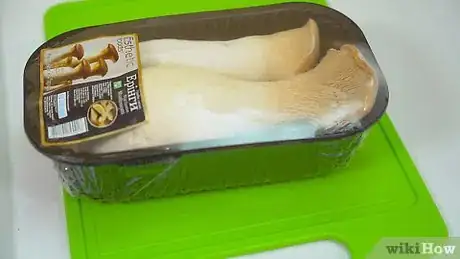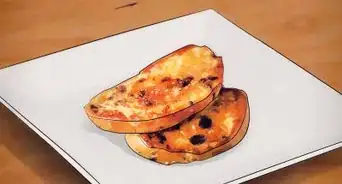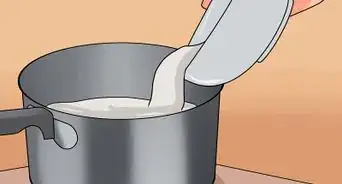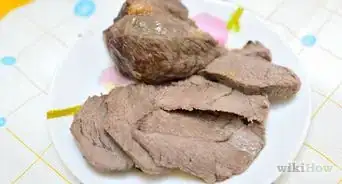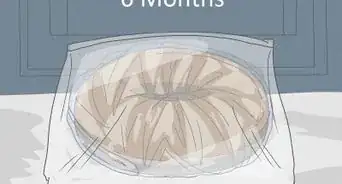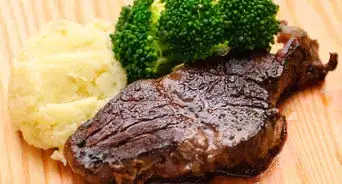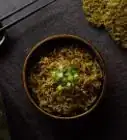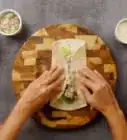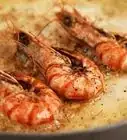This article was co-authored by Ollie George Cigliano. Ollie George Cigliano is a Private Chef, Food Educator, and Owner of Ollie George Cooks, based in Long Beach, California. With over 20 years of experience, she specializes in utilizing fresh, fun ingredients and mixing traditional and innovative cooking techniques. Ollie George holds a BA in Comparative Literature from The University of California, Berkeley, and a Nutrition and Healthy Living Certificate from eCornell University.
There are 12 references cited in this article, which can be found at the bottom of the page.
This article has been viewed 48,736 times.
King oyster mushrooms, also known as king trumpet mushrooms and Pleurotus Eryngii, are fantastic additions to any kitchen. They have small, brown caps and thick, white stems that pack a ton of flavor. They add a delicious, savory, but soft flavor to any dish and are said to taste similar to seafood like scallops or abalone. King oyster mushrooms are versatile, but they are also easy to prepare once you learn a few simple techniques.[1]
Steps
Cutting Long Strips
-
1Clean the mushrooms with water or a brush first. Pull apart any mushrooms that are stuck together, then wipe them off with a damp cloth. If you’re preparing lots of mushrooms, rinse them off gently under running water. Also, check the bottom part of the stem for any firm bits parts that have to be sliced off.[2]
- Mushrooms absorb water very easily, so don’t expose them to too much water. If you don’t want to use water at all, you can use a toothbrush or mushroom brush to scrub off any debris.
- King oyster mushrooms usually aren’t very dirty, so you don’t have to do much to clean them. A quick rinse is usually enough. If you know that they were cleaned before they were packaged, you won’t have to clean them yourself.
-
2Slice each mushroom in half lengthwise with a sharp knife. Set all of the mushrooms down on a cutting board with the bottom part of the stem facing you. Then, select a large knife, such as a chef’s knife, that can slice through the larger mushrooms cleanly. Start at the cap and work your way to the stem, cutting through the entire mushroom in one stroke.[3]
- When you get used to dealing with king oyster mushrooms, you won’t have to halve them before slicing them up. The halves are still easier to handle, but whole mushrooms are soft enough to slice up without much difficulty.
Advertisement -
3Cut the mushroom halves into thin slices about 3⁄8 in (0.95 cm) thick. Work on the halves one at a time. Hold one of the halves down with the cut end facing to the left or right. Then, slice lengthwise from cap to stem. Keep cutting until you have a bunch of consistent slices to cook into a delicious treat.[4]
- Sliced king oyster mushrooms are great when roasted in the oven or browned in a skillet. You could marinate them in teriyaki, for instance, and then fry them in an oiled skillet.
- The mushrooms can be cut thinner if you wish, but keep the slices all the same size so they cook at the same rate.
-
4Peel strips off the mushroom instead of cutting them for a more rustic presentation. Hold the mushroom down against your cutting board. With your other hand, stick a fork in the stem right beneath the cap. If you pull the fork toward the base of the stem, a few small threads will peel away. You can keep doing this to make something similar to pulled meat.[5]
- These small strips are great for tacos and any other recipe calling for shredded meat. They can be used as a vegetarian alternative to pulled pork, for instance.
- Another way to shred oyster mushrooms is by pinching the stem and pulling down toward its base.
Slicing Mushroom Rounds
-
1Scrub debris off of the mushrooms before cutting them. Brush off dirt with a damp cloth or another tool first. After washing off the dirt, make sure that the firm tip at the end of each mushroom’s stem has been removed. If they are still there, slice them off to finish cleaning the mushrooms.[6]
-
2Trim across the mushroom’s stem to separate it from the cap. Move the mushrooms onto a cutting board. Turn them all so the bottom part of the stem is facing you. Then, position your knife underneath the mushroom’s gills, which look like brown grooves between the cap and stem. Make a single slice horizontally across the stem to remove the cap.[7]
- The cap is edible, and there are many ways you can use it. For example, keep it in one piece and grill it with the stem. You could also cut it into smaller slices if your recipe calls for it.
- If you’re not planning on using the cap right away, you could store it for later. Put it in an open bag and cover it with a paper towel to use to make stock, for instance.
-
3Divide the stem into even, round slices by cutting across it. Move your knife down to the bottom of the stem. Measure up about 1 in (2.5 cm) from it, then cut across the width of the stem with one stroke of a sharp knife. Cut the entire stem up this way to get a bunch of nice, round slices that are great on the grill and in a number of different recipes.[8]
- You could also cut stems diagonally. You might find them easier to cut diagonally, but you will still end up with consistent slices.
- Vary up the size of the slices depending on your recipe. If you’re grilling mushrooms to make kebabs, for instance, larger slices are fine, but smaller slices cook faster on a stove or in the oven.
- Small mushrooms rounds cut 1⁄8 in (0.32 cm) wide or less are great when browned in a buttered pan or baked in an oven.
Scoring Mushroom Stems
-
1Wash off debris on the mushrooms with a damp cloth. Separate any connected mushrooms first, then scrub them all clean. Be sure to also cut off any firm spots on the stems. You can test the stems for tough spots by gently touching and squeezing them.[9]
-
2Slice the mushrooms in half lengthwise with a sharp knife. Place all of the mushrooms on a cutting board, turning them so the stem is facing you. Then, choose something like a chef’s knife that can cut through the entire mushroom in one stroke. Position it over the mushroom’s cap and cut straight down through its center. Continue cutting down the length of the stem to divide the mushroom into two equal halves.
- Halved mushrooms cook much faster and more evenly. They are also a little easier to score than ones sliced into rounds.
- You could cut off the mushroom caps if you don’t plan on cooking them right now. Remove them before slicing the mushrooms in half.
-
3Score each mushroom by making shallow, diagonal cuts along the stem. Measure halfway across the bottom edge of the stem. Position your knife there, pointing it diagonally towards one of the stem’s sides. Then, slowly cut no more than halfway through the stem. Slice the rest of the stem the same way, leaving about 1⁄5 in (0.51 cm) between each score mark.[10]
- The score marks are similar to what you would do if you were cutting the mushrooms into slices, except you don’t cut all the way through them.
- You could also turn the mushrooms over to score the opposite side, but make sure you don’t cut all the way through it!
-
4Turn the mushrooms to score them in the opposite direction. Rotate them slightly so you’re able to cut across the first set of score marks. Start near one edge of each stem, slicing across it at a diagonal angle. When you cut into the stems, stop about halfway down so they don’t break apart. Space the score lines 1⁄5 in (0.51 cm) apart for a consistent crisscross grid that leaves the mushrooms intact.[11]
- Scoring is great for any time when you want oyster mushrooms to absorb more moisture. For example, you could coat them with a sauce or glaze, and they will absorb more flavor than usual.
- Scored mushrooms are great on the grill, but they can also be browned in a pan or even roasted in the oven.
Things You’ll Need
Cutting Long Strips
- Chef’s knife
- Cutting board
- Rag or paper towel
Slicing Mushroom Rounds
- Chef’s knife
- Cutting board
- Rag or paper towel
Scoring Mushroom Stems
- Chef’s knife
- Paring knife
- Cutting board
- Rag or paper towel
References
- ↑ https://www.seriouseats.com/2008/12/grocery-ninja-king-oyster-mushrooms-aka-drums.html
- ↑ https://www.seriouseats.com/2014/10/knife-skills-how-to-clean-shiitake-portobello-oyster-mushrooms.html
- ↑ https://www.youtube.com/watch?v=fGuG4sFz56A&feature=youtu.be&t=5
- ↑ https://www.youtube.com/watch?v=B1sMoNv6p38&feature=youtu.be&t=355
- ↑ https://www.youtube.com/watch?v=B1sMoNv6p38&feature=youtu.be&t=457
- ↑ https://www.cooksillustrated.com/articles/1442-our-guide-to-fresh-mushrooms
- ↑ https://www.seriouseats.com/recipes/2016/06/grilled-king-oyster-mushrooms-bacon-teriyaki-glaze-recipe.html
- ↑ https://www.seriouseats.com/recipes/2016/06/grilled-king-oyster-mushrooms-bacon-teriyaki-glaze-recipe.html
- ↑ https://www.cooksillustrated.com/articles/1442-our-guide-to-fresh-mushrooms
- ↑ https://www.youtube.com/watch?v=bdwm9_ndLrg&feature=youtu.be&t=43
- ↑ https://www.youtube.com/watch?v=B1sMoNv6p38&feature=youtu.be&t=231
- ↑ https://www.thekitchn.com/ingredient-spotlight-king-trum-110829
- ↑ https://www.cooksillustrated.com/features/8349-mushrooms-101-everything-you-need-to-know
- ↑ https://www.thekitchn.com/mushroom-recipes-tips-and-ideas-22928081
